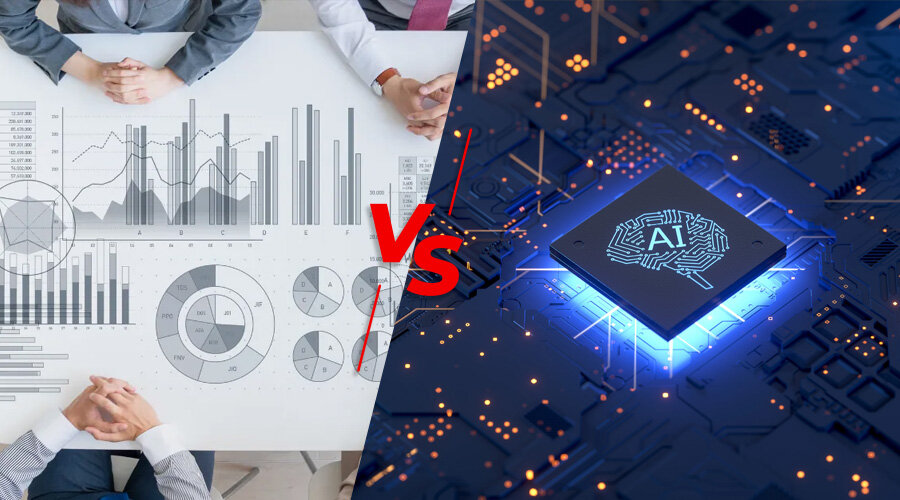Source – https://www.analyticsinsight.net/
The differences between data science vs artificial intelligence divided over many interfaces
On a normal day, we come across the buzzwords ‘artificial intelligence’ and ‘data science’ at least once. Whether we agree or not, both technologies have made a significant impact on our lives. They are the most important technologies that we prefer to imply in our routine. However, the combat on data science vs artificial intelligence is never-ending.
To begin with, data science and artificial intelligence are totally different. Data science makes use of artificial intelligence at times, but it doesn’t completely represent AI. Even though they fall under the same domain and are connected to each other, they have their specific applications and meaning. Both are popular and sought-after technologies that have their own sets of concepts and applications. Of course, they have some common topics and times, but they may overlap. In this article, we are going to convey the possible differences in data science vs artificial intelligence by knocking on its applications, scope, jobs, etc. We also take you through career options like data scientist and artificial intelligence engineer to state the job difference.
Introduction
Data science: Owing to the ballooning data and growing need for diverse industries to rely on data, data science has gained a significant place in the world today. Data science holds the advantage of accelerating the fourth industrial revolution using advanced technologies. Manufacturing houses use data science to create better and customized products for consumers. Besides, the need for data is continuously spiking with the demand for data science technologies going up. Data has become a dire need for industries that need data to make careful decisions.
The basics of data science fall into the categories of statistics, mathematics, and programming. Henceforth, a data science professional is expected to be proficient in them in order to understand the trends and patterns in data. Data science professionals carry on with works like data extraction, manipulation, visualization, and maintenance of data to forecast the occurrence of future events.
Artificial intelligence: In general, artificial intelligence is designed to imitate human actions through machines. The technology uses algorithms to comment on autonomous actions that are routinely performed by humans. Earlier, when artificial intelligence came into effect for the first time, researchers found it hard to discover a relevant algorithm to power the technology. But thanks to emerging trends like deep learning, the hunt to embrace relevant algorithms is going smoothly today.
Over the years, tech giants like Google, Amazon, and Facebook are increasingly relying on artificial intelligence to develop autonomous solutions. For example, Google’s AlphaGo, the autonomous GO playing system has defeated Ke Jie, the world’s number one professional GO player. The system used artificial neural networks modeled after human neurons to learn and combat with the real-life player.
Scope
Data science: Data science plays a critical role in influencing business operations. The technology is the pushing force behind business intelligence that is making a significant impact in the world today. As data science deals with huge chunks of data, they formulate reports which are helpful in drawing interferences. Data scientists use data science techniques to pick up and understand the data trends in any particular business field and presenting business forecasts. Some of the general applications of data science are,
Predictive casual analytics: Data scientists use predictive analytics to derive business insights. They help business executives look at the future outcomes of business actions in a given period.
Prescriptive analysis: Prescriptive analysis leverages the right business goal by prescribing the actions which are most likely to succeed.
Artificial intelligence: Artificial intelligence is seen as a popular culture that influences futuristic robots and the machine-dominated world. Fortunately, in reality, artificial intelligence serves more purpose than that. In laymen’s term, the technology aims to enable machines to execute reasoning by replacing human intelligence. The main objective of artificial intelligence is to feed machines with relevant information to make them human-friendly and brilliant. Artificial intelligence engineers rely on deep learning and natural language processing to help machines identify patterns and inferences. Some of the applications of artificial intelligence are as follows.
Making automation easy: With the help of artificial intelligence, automation becomes extremely easy. Artificial intelligence allows the machine to take over repetitive and time-consuming tasks, freeing humans to carry out intellectual tasks.
Intelligent products: Artificial intelligence applications when paired with conversational platforms, bots, and other smart technologies unravel intelligent products.
Jobs and career
Data science: Some of the top most data science careers options are listed below,
• Data scientist
• Data engineer
• Data architect
• Statistician
• Data analyst
• Machine learning engineer
• Business analyst
Remarkably, data scientist role is the most chosen profession of all in data science. Data scientists use technologies like big data analytics, cloud computing, and machine learning to analyze datasets, extract valuable insights for future predictions. Data scientists are entitled to carry out tasks like gathering the data, analyzing them, and transforming them to make valuable business insights. They deliver end-to-end solutions using multiple tools and technologies.
Artificial intelligence: Some of the top most artificial intelligence careers are listed below,
• Artificial intelligence engineer
• Robotics scientist
• Machine learning engineer
• Big data engineer
• Software engineer
• AI research scientist
Artificial intelligence engineer is the most picked choice among all the artificial intelligence career options. With the help of machine learning techniques, artificial intelligence engineers help build models to rev up AI-based applications. Artificial intelligence engineer initiates, develops, and delivers production-ready AI products by collaborating with the data science teams to the business for improved business processes and insights.
